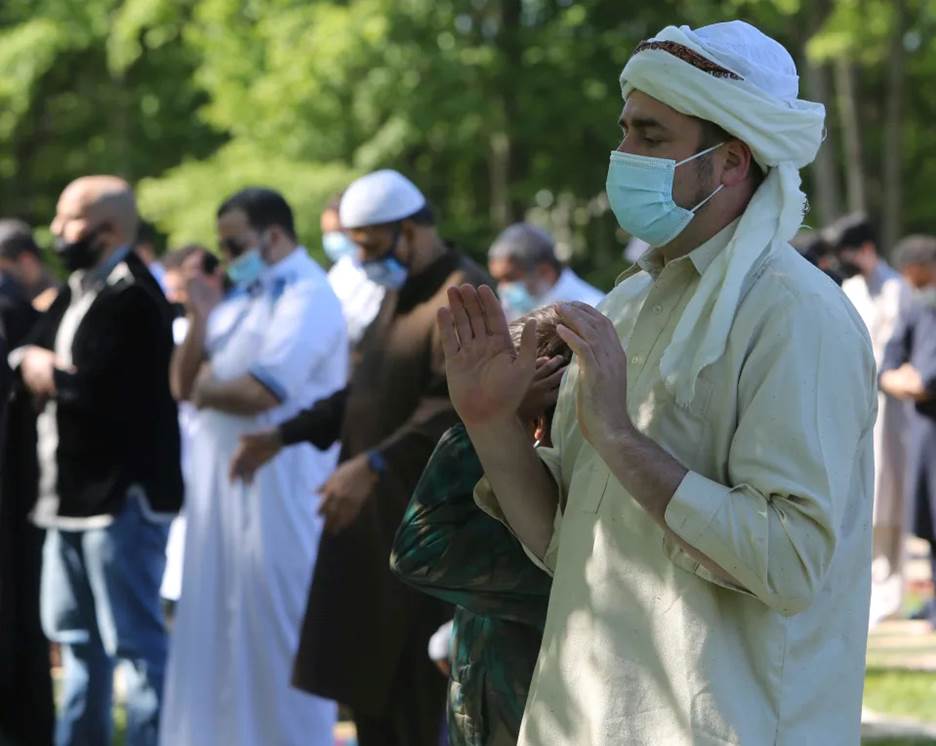
Members of Delaware's Muslim community mark the last day of Ramadan with prayer
The Essence of the Essence of Islam
By Dr Muqtedar Khan
Delaware

In the sacred month of Ramadan, I wished to share with those who are curious about Islamic beliefs, some of its core values.
There are two primary sources of Islam, The Holy Qur’an, and the traditions of Prophet Muhammad (pbuh). Muslims believe that the Qur’an is the literal, complete and final testament of God to all of humanity.
The second source is the compendium of thousands of traditions and sayings of Prophet Muhammad. Some collections have thousands of traditions called Hadith, and some have 40 traditions usually focused on one theme. The most famous and most valued of these mini collections is the collection of 42 traditions by Imam Nawawi (1230 to 1277 CE), who is widely recognized as a very important Islamic scholar. His collection chose traditions which captured the essence of Islam. Hence its significance and popularity.
The traditions in this collection are so critical that I spent seven years writing a book based just on one of the three elements in the second Hadith of this collection. The topic was Ihsan, meaning to do beautiful things, and the book is titled " Islam and Good Governance." For this short essay, I have selected ten traditions from this collection and present them as the essence of this collection, hence the title, The Essence of the Essence of Islam.
Here they are:
- 1. Prophet Muhammad said that the value of an individual’s action is shaped by his intention. This idea is also well recognized by ethical and more philosophers. Actions gain moral meaning primarily based on intention.
- 9. Prophet Muhammad spoke about the relationship between obligation and capacity. He said “what I have forbidden for you, avoid. What I have ordered you to do, do as much of it as you can (emphasis are mine).
- 11. Prophet Muhammad said, “Leave what makes you doubtful for what does not”. I love this tradition. It recognizes the moral and ethical agency of humanity. Our conscience is capable of instinctively recognizing the wrong hence the doubt. We can then choose another path that our conscience is comfortable with. Islam recognizes the believer to be a thinking, reflective, agent with a moral conscience.
- 13. Prophet Muhammad said, “Love for your brother what you love for yourself.” Without internalizing this principle, one’s faith would be incomplete according to the Prophet. It essentially says treat others as you would want to be treated (The Golden Rule). This hadith was once quoted by President Barack Obama .
- 15. Prophet Muhammad said, “Let him who believes in Allah and the day of judgement, speak good or keep silent, be generous to his neighbor and be generous to his guest.” If Muslims observed just this one teaching in their conduct, they would be the most loved community wherever they live.
- 16. A man asked Prophet Muhammad “give me advice?” multiple times. Each time the noble prophet responded with “do not get angry”. Imagine a world where people never got angry.
- 17. Prophet Muhammad said “Allah has commanded that whatever you do, do it beautifully. I once gave a TEDx talk on this Hadith. Imagine a world where every action pursued beauty, imagine a world of beautiful politics.
- 24. This is a very long Hadith, but its first command is that God said “O My servants I have forbidden oppression for myself, and it is forbidden for you, so do not oppress one another.
- 32. This short saying of Prophet Muhammad has profound implications for social harmony. He said, “Do no harm and do not respond to harm, (emphasis are mine). If only people followed this teaching.
- 34. The Prophet commanded Muslims to be a force for good and act as change agents. He said, “Whosoever of you sees an evil, let him change it with his hand; and if he is not able to do so, then with his tongue; and if he is not able to do so, then at least acknowledge the evil in his heart – that is the weakest faith. I love this teaching. It tells me that faith is about making a difference for the good.
In these ten traditions, I have brought the wisdom and teachings of Prophet Muhammad (pbuh) to you. Indeed, they capture the essence of Islam as a social paradigm and are a far cry from Islam as an ideology of power and politics. I hope all of us, Muslims and non-Muslims, believers and atheists, reflect on these values and choose a few of them to embrace and realize in our lives, to create a better world for all.
(Dr Muqtedar Khan is Professor at the University of Delaware and the host of a YouTube show called Khanversations . This article originally appeared on NorthJersey.com)

